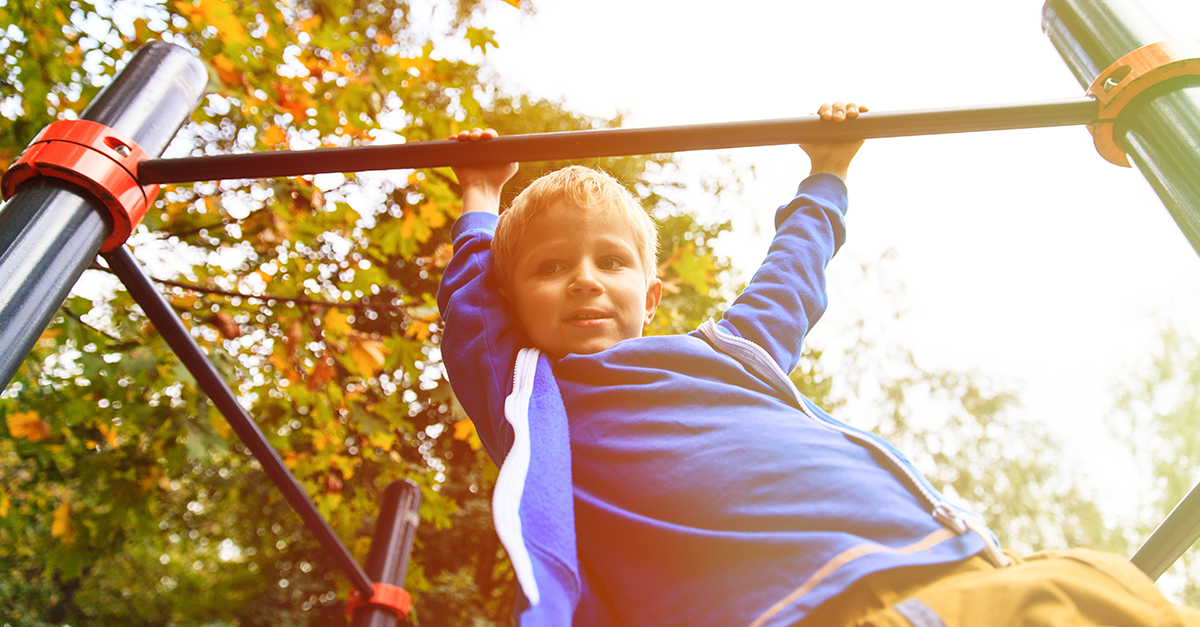Risky Play: A Need of The Soul

When my brother and I were kids, we invented a variety of playground games which involved using equipment in ways they weren’t exactly intended for. These games included:
1. Swing-jumping: we would push an empty swing, then sprint toward it and attempt to jump over the seat and through the metal chains.
2. Monkey bar leg wrestling: we would each swing out to the middle of the jungle gym, and then attempt to pull the other down using only our legs.
3. King of the Hill on metal bars protruding from the ground: this game was promptly ended (by us) after one of our friends slipped and landed with the bar straddled between his legs.
As I think about the number of stupid things we did as kids as part of our play – including swinging wooden swords at each others’ head, sticking paper clips in electric outlets, and spraying fire with a can of spray deodorant and a lighter – I am amazed that we grew up with no serious injuries to speak of. I’m sure we are the direct cause of several of my mother’s gray hairs! Looking back on my childhood, I am grateful that despite the dangers of our imaginative play, our parents allowed us the opportunities needed to learn to navigate risk. Their willingness to step back, watch with worry (or not watch at all), and choose not to always intervene, was essential part of my development into a healthy adult.
How Risk Can Be Beneficial to the Soul
The 20th century French philosopher Simone Weil describes risk as a need of the soul. In her book The Need for Roots, which explores counter-balancing needs of the soul, she writes:
The human soul has need of security and also of risk. The fear of violence or of hunger or of any other extreme evil is a sickness of the soul. The boredom produced by a complete absence of risk is also a sickness of the soul.
While it might seem counter-intuitive that risk is necessary for our flourishing, Weil strengthens her argument by noting that “the absence of risk weakens courage to the point of leaving the soul.” Too much risk and too little security renders us fearful and anxious and leaves us disempowered. But a moderate amount of risk is a healthy component of life, and it lets us develop fortitude, courage, and an awareness that we can tackle challenges.
Risky Play
I was reminded of Weil’s insight recently when I read an article in CityLab about the return of risky playgrounds. The article laments how, in the last decade or so, our playgrounds have “become mind-numbingly standard-issue—with the same type of plastic swing sets and slides—designed to minimize harm, rather than maximize enjoyment.”
The article then highlights adventure playgrounds, spaces that “look like scrap yards, with loose tires, blocks of wood, rope, and tools like hammers and nails, where children are free to build and destroy their surroundings as they choose. They can even set fires.”
This description of the playground had me grinning: the inner child is still inside me!
I’m not a parent, and I can’t imagine the amount of anxiety that is created by parenthood. Being responsible for reckless boys and girls with a surplus of energy sounds terrifying! Now that I’m older, I can really appreciate the times, for example, my parents forced me to wear a helmet when skateboarding (but I wanna look cool, Mom!). But I worry about current trends in parenting that attempt to remove all risk from kids’ lives and that don’t give them space for unstructured play.
I can’t help but wonder if there is more than just a correlation between the helicopter parent phenomenon and the rise of anxiety in today’s kids whose heavily structured and monitored lives don’t allow them opportunities to fail, to get injured, to make mistakes, and to develop grit.
I’m not alone in these concerns: the American Academy of Pediatrics released a report entitled “The Power of Play: A Pediatric Role in Enhancing Development in Young Children.” In the report, the Academy recommends that pediatricians “write a prescription for play,” and specifically of unstructured and perhaps slightly risky play.
The Academy writes: “Play is not frivolous: it enhances brain structure and function and promotes executive function (ie, the process of learning, rather than the content), which allow us to pursue goals and ignore distractions.”
In addition the Academy warns that without play, “toxic stress can disrupt the development of executive function and the learning of prosocial behavior.” On the other hand, play can help kids regulate their stress:
Play, especially when accompanied by nurturing caregiving, may indirectly affect brain functioning by modulating or buffering adversity and by reducing toxic stress to levels that are more compatible with coping and resilience.
I think the key is found somewhere in the balance of unstructured play and attentive caregiving.
Anyone who has read the classic novel The Lord of The Flies knows that leaving kids to their own devices for prolonged periods of time results in anarchy and destructiveness. But anyone who has read The Adventures of Tom Sawyer knows that kids thrive when they can pursue adventures! Ultimately, I think what my parents did so well was to let me as a kid learn to assess risk, while they themselves assessed my ability to do that, and intervened in situations where serious danger was imminent and I was oblivious. There’s no scientific formula for all of this but speaking as someone who has spent more years so far as a kid than as an adult, I am confident that kids are resilient.
After all, there are worse things in life than face-planting in the dirt when your foot gets caught on the seat as you attempt to jump through that swing!